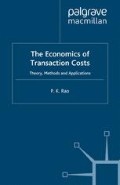Abstract
The transaction costs (TC) paradigm offers a general framework for examining the choice of policy instruments and/or regimes for the management of resources and economic entities. The most fundamental unit of analysis in the economics of organization theory is the transaction. The TC paradigm enables articulation and choice of organizations geared to meet stated objectives.
Access this chapter
Tax calculation will be finalised at checkout
Purchases are for personal use only
Preview
Unable to display preview. Download preview PDF.
References
Barnard, C. (1938) The Functions of the Executive (Cambridge, Mass.: Harvard University Press).
Eisenhardt, K. M. and Martin, J. A. (2000) Dynamic Capabilities: What Are They?, Strategic Management, 21, pp. 1105–21.
Furubotn, E. G. and Richter, R. (2000) Institutions and Economic Theory (Ann Arbor, Mich.: University of Michigan Press).
Guinnane, T. W. (2001) Cooperatives as Information Machines: German Rural Credit Cooperatives 1883–1914, Journal of Economic History, 61, pp.366-89.
Hayek, F. (1945) The Use of Knowledge in Society, American Economic Review, 35, pp. 519–30.
Hurwicz, L. (1972) On Informationally Decentralized Systems, in McGuire, C. and Radner, R. (eds), Decision and Organization (Amsterdam: North-Holland), pp. 297–336.
Hurwicz, L. (1979) The Design of Mechanisms for Resource Allocation, in Intrilligator, M. D. (ed.), Frontiers in Quantitative Economics (Amsterdam: North-Holland), pp. 3–42.
Laffont, J. J. and Martimort, D. (1998) Transaction Costs, Institutional Design and the Separation of Powers, European Economic Review, 42, pp. 673–84.
Milgrom, P. and Roberts, J. (1990) Bargaining Costs, Influence Costs, and the Organization of Economic Activity, in Alt, J. and Shepsle, K. (eds), Perspectives on Positive Political Economy (Cambridge University Press), pp. 57–89.
Nelson, R. R. and Winter, S. G. (1982) An Evolutionary Theory of Economic Change (Cambridge, Mass.: Belknap Press).
North, D. (1990) A Transaction-Cost Theory of Politics, Journal of Theoretical Politics, 2, pp. 355–67.
Pryor, F. L. (1994) Growth Deceleration and Transaction Costs: A Note, Journal of Economic Behavior and Organization, 25, pp. 121–33.
Rao, P. K. (1978) Hierarchical and Decentralised Planning and Decision-Making: A Synthesis of Analytical Models, in Titli, A. (ed.), Control and Management of Integrated Industrial Complexes (Oxford: Pergamon Press), pp. 237–48.
Rockefeller, R. T. (1970) Convex Analysis (Princeton, NJ: Princeton University Press).
Teece, D. J., Pisano, G. and Shuen, A. (1997) Dynamic Capabilities and Strategic Management, Strategic Management Journal, 18, pp. 509–34.
Varian, H. (1990) Monitoring Agents with Other Agents, Journal of Institutional and Theoretical Economics, 146, pp. 153–74.
Williamson, O. E. (1996) The Mechanisms of Governance (New York: Oxford University Press).
Winter, S. G. (2000) The Satisficing Principle in Capability Learning, Strategic Management Journal, 21, pp. 981–96.
Yarbrough, B. V. and Yarbrough, R. M. (1994) International Contracting and Territorial Control: The Boundary Question, Journal of Institutional and Theoretical Economics, 150, pp. 239–64.
Author information
Authors and Affiliations
Copyright information
© 2003 Krishna Rao Pinninti
About this chapter
Cite this chapter
Rao, P.K. (2003). Organizations Theory. In: The Economics of Transaction Costs. Palgrave Macmillan, London. https://doi.org/10.1057/9780230597686_8
Download citation
DOI: https://doi.org/10.1057/9780230597686_8
Publisher Name: Palgrave Macmillan, London
Print ISBN: 978-1-349-42185-5
Online ISBN: 978-0-230-59768-6
eBook Packages: Palgrave Economics & Finance CollectionEconomics and Finance (R0)

